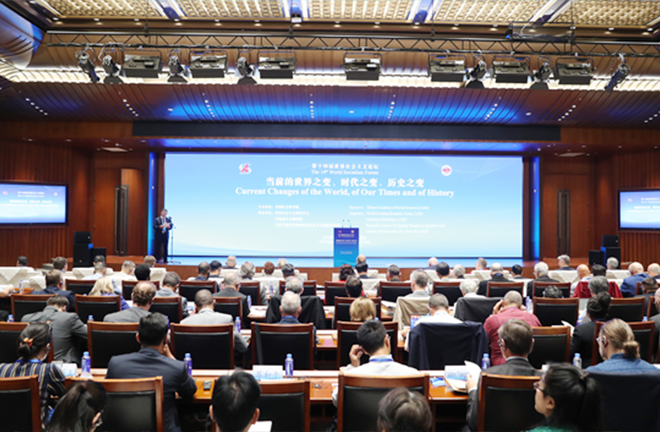Forum affirms promise of socialism

A scene of the forum Photo: Zhu Gaolei/CSST
The 14th World Socialism Forum took place in Beijing on Sept. 9–10, focusing on the theme of “Current Changes of the World, of Our Times, and of History.” Over 60 leaders of foreign communist parties, Marxist scholars, left-wing social activists, and ambassadors to China from more than 30 countries conducted in-depth discussions on topics including profound changes unseen in a century around the world and China’s responsibilities in these shifts, global power rebalancing, socialism with Chinese characteristics and the development of world socialism, challenges and trends facing Western capitalism, and the ongoing sci-tech and industrial transformation and the development of world socialism.
In his keynote address at the opening ceremony, Zhen Zhanmin, vice president of the Chinese Academy of Social Sciences (CASS), highlighted the unprecedented transformations taking place in our world, our times, and history, emphasizing that socialism with Chinese characteristics is a notable driving force behind these changes.
Socialism with Chinese characteristics in the new era has greatly enriched and expanded theories and practices of scientific socialism, showing to the world the strengths and strong vitality of the socialist system, and infusing global socialist movements with renewed energy and optimism, Zhen said.
Zhen added that the ongoing global, historical, and societal changes have created significant opportunities for the development of world socialism. As communist parties and socialist forces worldwide strive to explore a socialist path tailored to their own countries’ national conditions, they are also enhancing contact and cooperation through bilateral and multilateral channels. Their efforts have strengthened the power of world socialism, deepened explorations of this political movement, and advanced its development.
Phouvong Ounkhamsaen, president of the Lao National Academy of Political and Public Administration, said that the achievements of the CPC in the past century, the continuous development of other socialist countries, and the exploration of the path of socialist development in the new century by Western communist parties have evidenced socialism’s enduring vitality. Ounkhamsaen argued that the collapse of the Soviet Union and socialism in Eastern Europe did not signal the end of communist ideals, expressing confidence that socialism remains the best alternative to capitalism.
According to José Luis Centella, president of the Communist Party of Spain, the recently concluded Third Plenary Session of the 20th CPC Central Committee has upheld China’s spirit of productive enterprise and pragmatism, as well as the development of 21st-century Marxism. He noted that China’s achievements in high-standard modernization, driven by deepened reforms, are closely linked to the country’s vision of building an international community that jointly copes with global challenges and fostering a harmonious, peaceful, and progressive future for humanity.
Gyula Thurmer, president of the Hungarian Workers’ Party, said that China has formulated a unique set of modernization principles distinct from those of the West—namely reform, innovation, and sustainability. Behind socialism with Chinese characteristics lies the further development and enrichment of Marxism, underscoring that Marxism is not a static dogma; it can be further developed in accordance with national characteristics.
The importance of China’s model was reiterated by Roman Romanov, deputy director of the Primakov Institute of World Economy and International Relations of the Russian Academy of Sciences. He said that China’s success in reform can inspire other countries to enhance innovation and discover new drivers for development. “The inclusion of the concept of new quality productive forces in the Resolution of the Third Plenary Session of the 20th CPC Central Committee is a continuation of the CPC’s efforts to combine Marxist theory with Chinese practice,” he stressed.
Pham Van Duc, former vice president of the Vietnam Academy of Social Sciences, emphasized that the successes of socialist countries, particularly China, have enhanced global recognition of socialism as a viable and stable path for development. Today, the socialist path holds more promise than ever before.
The forum was hosted by CASS, and organized by the World Socialism Research Center, the Academy of Marxism, and the Research Center on Xi Jinping Thought on Socialism with Chinese Characteristics for a New Era at CASS.
Edited by CHEN MIRONG

 PRINT
PRINT CLOSE
CLOSE